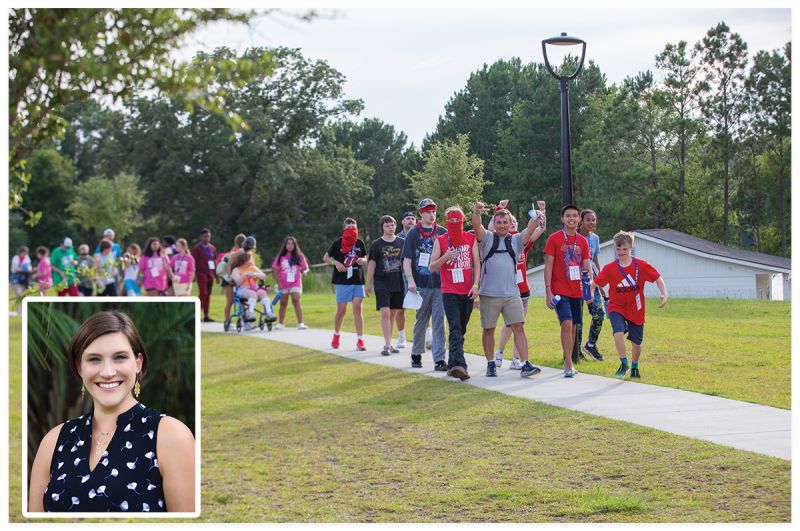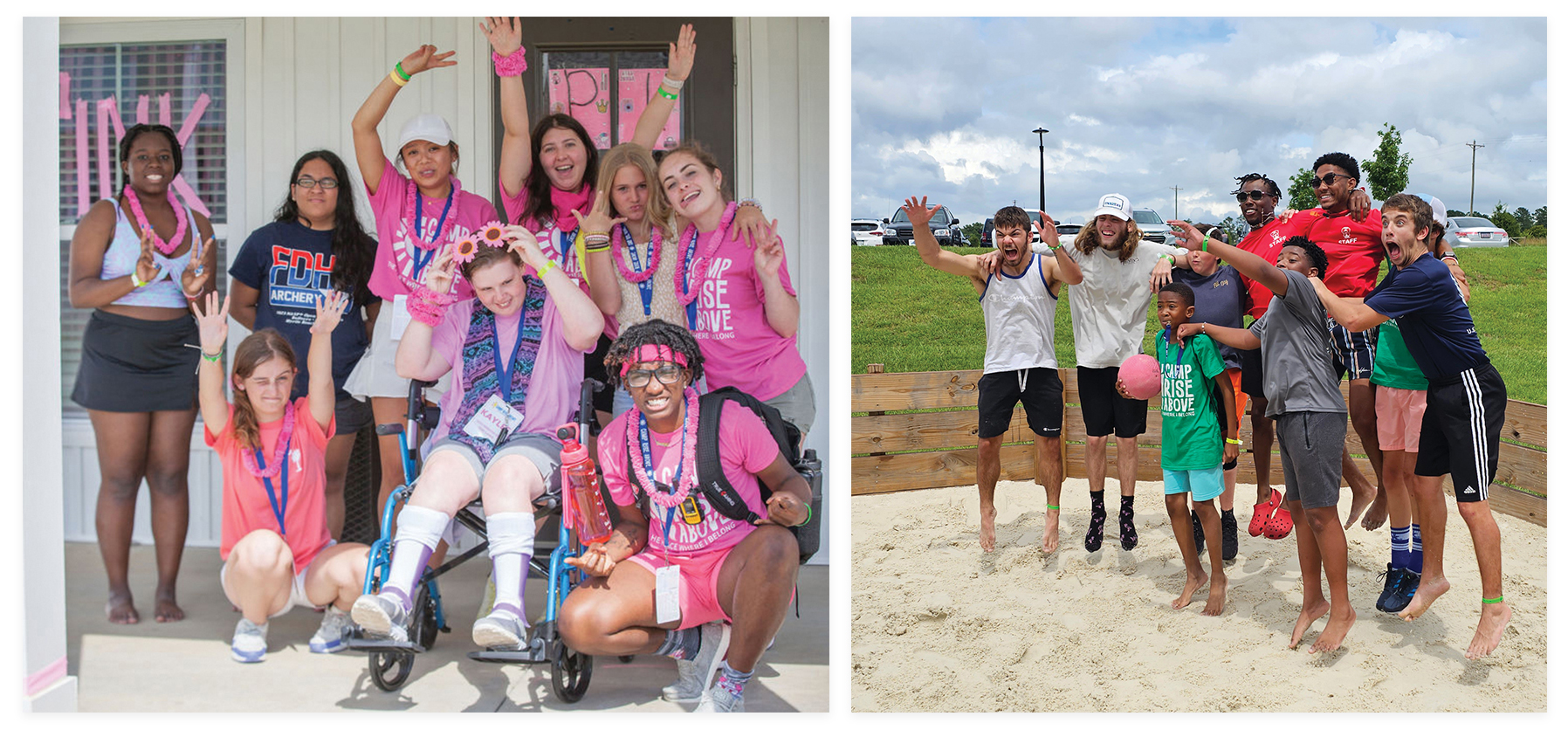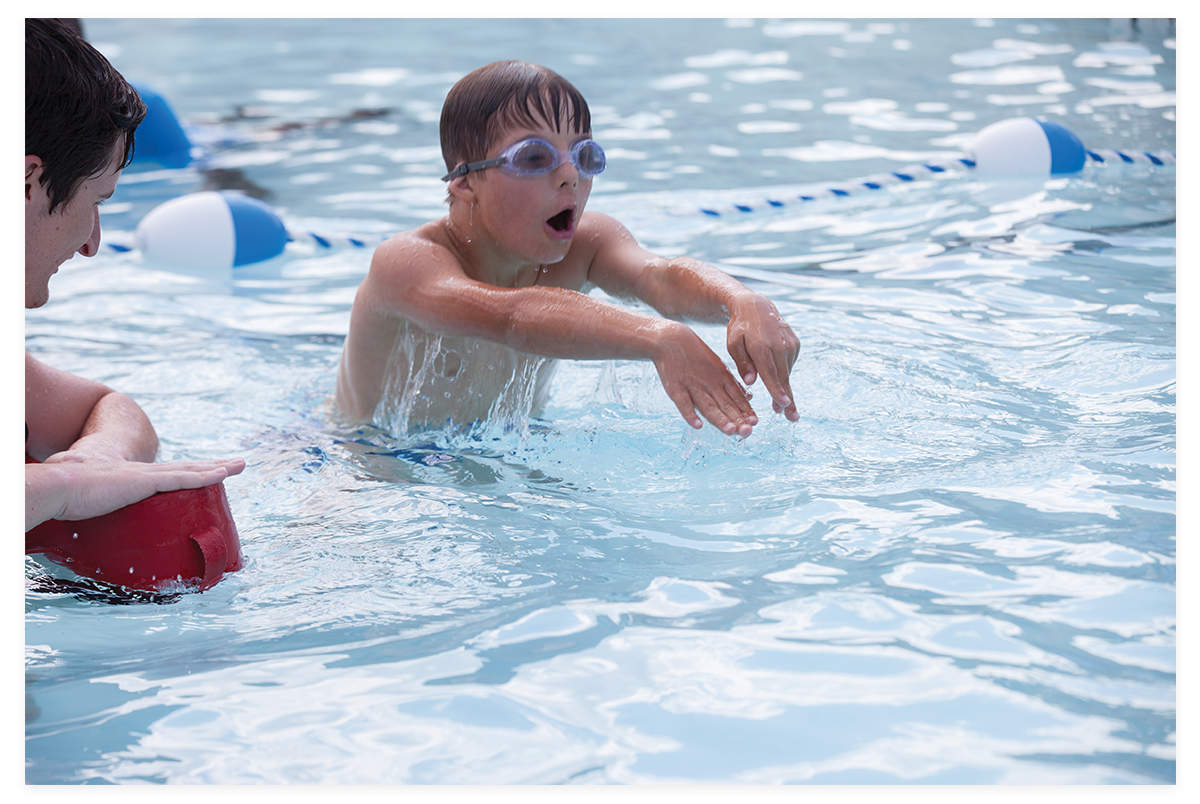Learn about the nonprofit’s plans to expand in the Lowcountry

Camp Rise Above offers children with medical diagnoses a safe environment to participate in traditional summer camp activities such as swimming, fishing, rock climbing, and crafts, helping them to develop confidence and independence; (inset) executive director Erin Ulmer.
The boy gazed out over the park canopy in wonder. “I see the tops of all the trees,” he marveled from the 50-foot summit of the James Island County Park rock wall, which the wheelchair-bound camper had reached thanks to an adaptive harness. That shift in perspective is precisely what Camp Rise Above aims for. “Our campers don’t identify as having Down syndrome or autism or asthma. They’re simply kids being kids,” says longtime executive director Erin Ulmer. “We want to create places of belonging for everyone in the community regardless of a disability or diagnosis.”
Founded in 2008 by hospice nurse Barbara Denton, Camp Rise Above has shared the magic of camp with Lowcountry children and adults facing medical challenges such as sickle cell anemia, cerebral palsy, epilepsy, and brain tumors. “We serve more than 30 different diagnosis populations,” explains Ulmer, a former camp counselor and teacher. Working with a volunteer medical team, the nonprofit delivers safe and inclusive day and overnight programs that can respond to participant needs in a way that most traditional camps cannot.
Twice a summer, Camp Rise Above gathers at James Island County Park, where campers are paired with adult volunteers whose sole focus is their buddy’s safety and entertainment. Each morning, the group takes over the water park, where accommodations are made for every child, including water wheelchairs for the lazy river. “The park works really hard to adapt all of its programs to our needs,” says Ulmer. Using golf carts to navigate the grounds, participants enjoy fishing, archery, boating, rock climbing, arts and crafts, and a closing talent show. “We cram a week of camp into two days,” she laughs. “It’s a great way for families to dip their toes into the world of camp.”

For those able to stay overnight, the nonprofit also hosts a sleepaway session at Camp Cole, an accessible site in Eastover, south of Columbia, that boasts wide sidewalks, a zero-entry pool and showers, and automatic doors. Nearly 100 campers and 180 volunteers spend the week paddleboarding, canoeing, fishing, riding horses, performing, and more. “Like any traditional summer camp, our campers form new friendships and gain a sense of belonging, many for the first time in their lives,” reflects Ulmer, who recalls one group of buddies who went on to form a year-round archery team. Of course, the camp experience wouldn’t be complete without a silly prank or two, like the time campers filled a counselor’s car with balloons before sealing it in Saran wrap. “Kids with medical challenges don’t often get a lot of choice in their days, so we try to give them as much freedom as possible.”
“Overnight camp allows campers of all ages, both adults and children, the opportunity to develop confidence and independence, while also providing respite to the loved ones who care for them every day,” continues the director, explaining that every Camp Rise Above program is free to participants. “We’re honored that these families trust us to keep their campers just as safe as they do at home.” To that end, the organization also maintains a round-the-clock volunteer medical staff, including off-duty doctors and nurses, graduate students, and special education teachers.

Still, not everyone can make the trek to Camp Rise Above, so the team also visits Summey Medical Pavilion and MUSC Shawn Jenkins Children’s Hospital monthly to deliver themed activities and a sense of normalcy. Patients can sit by a pretend campfire, engage in crafts and games, and practice archery—“all sorts of fun stuff that breaks up the monotony of being stuck somewhere,” says Ulmer.
The nonprofit has its sights on creating an inclusive campus here in the Lowcountry that can host camps and community programming throughout the year. One in three people in South Carolina lives with a disability, says Ulmer. “I think the Lowcountry is overdue for a space like this.”